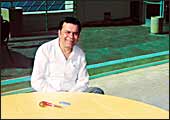|
 Ask
questions. when something is wrong, you will feel the constraint.
Make a clear distinction between undesirable effects and core constraint.
Look beneath the surface. Set up a group of your staff. Work with
them to use the undesirable effects as a source of clues to the
core problem. Then work together to create a correct solution." Ask
questions. when something is wrong, you will feel the constraint.
Make a clear distinction between undesirable effects and core constraint.
Look beneath the surface. Set up a group of your staff. Work with
them to use the undesirable effects as a source of clues to the
core problem. Then work together to create a correct solution."
That's Eli Goldratt, author and guru. He is
famous for two things. For using fiction-through his novel, The
Goal-to discuss business in an easy-to-get format. And for his Theory
of Constraints (TOC). This novel, and he has written many others,
is about a manager called Alex Rogo. Operating on a two-month ultimatum
to turn his unit around, Rogo discovers that a process is only as
good as its weakest link. So he gets to the underlying weakness,
fixes it and saves his unit (and job).
From there comes the TOC, which has set the
current tone of constraint management. Goldratt's method? First,
attain clarity. Sort through the clutter of symptoms to identify
the actual constraint. Focus on this weak link. Next, to effect
change, look for a win-win solution (the 'cloud' is just a Western
analogy he uses; it could arguably be a creative stimulant for solutions),
and then work out ways to overcome resistance. This will turn 'current
reality' into an envisioned 'future reality'.
Goldratt is also a stickler for first principles.
Asking questions, to him, is the part people are most susceptible
to get wrong. Assumptions, in particular, need to be questioned
most rigorously. "Everybody is rational," he once declared,
"Unfortunately, not everybody starts from rational assumptions.
I had this debate once with Israeli intelligence. They wanted to
use my methods. After four or five days, when we had analysed many
things, they said, 'Wait a minute. We have here a preconception
problem. We're analysing everything logically. But some of our enemies
are not logical. So whatever we do in terms of predicting what they
are doing is worthless.' I said, 'No, what we call irrational behaviour
is simply the person behaving according to another set of assumptions.
But within that he is very logical.' Many times, we claim that people
are behaving irrationally because we put them into a conflict, and
we are looking at only one side of the conflict. So, of course it
looks to us as though they are behaving irrationally."
That's remarkable realism from a writer of
fiction. But then, why assume a work of imagination to be somehow
less serious about finding solutions? "A story is a reality
frame," Goldratt once said.
|
